外研版(2019)必修第一册Unit 4 Friends forever Grammar(29张PPT)
文档属性
| 名称 | 外研版(2019)必修第一册Unit 4 Friends forever Grammar(29张PPT) |  | |
| 格式 | zip | ||
| 文件大小 | 5.1MB | ||
| 资源类型 | 教案 | ||
| 版本资源 | 外研版(2019) | ||
| 科目 | 英语 | ||
| 更新时间 | 2022-07-11 14:15:15 | ||
图片预览


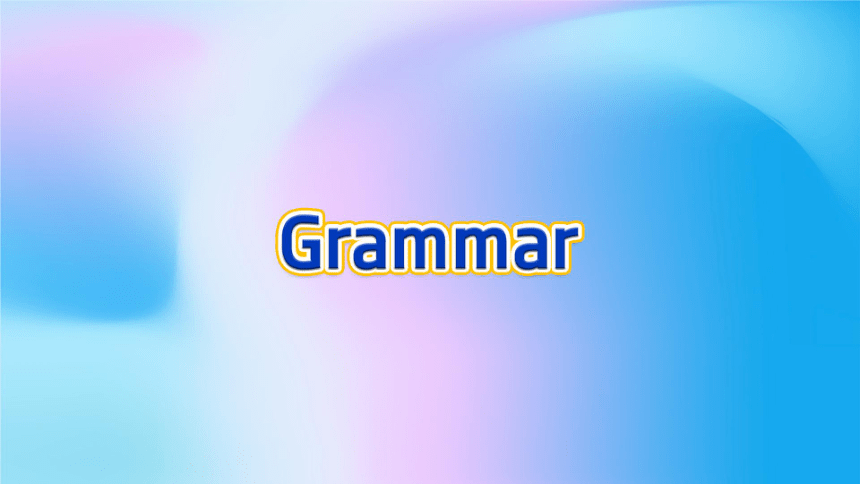
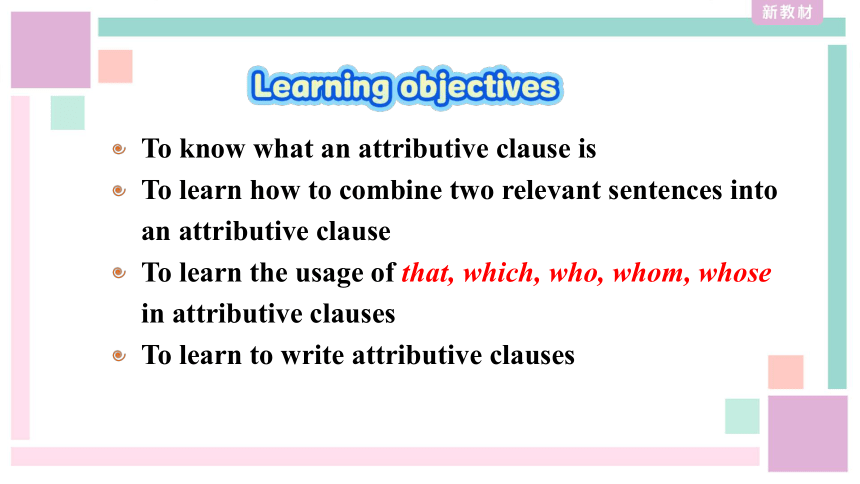
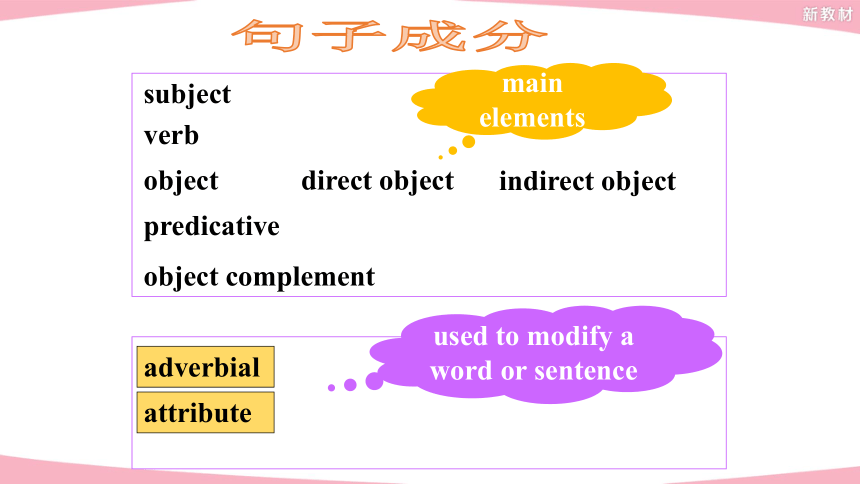
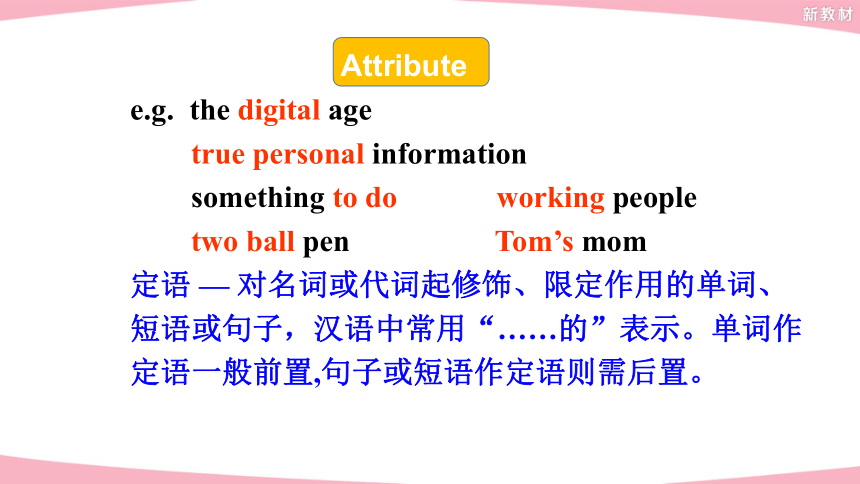
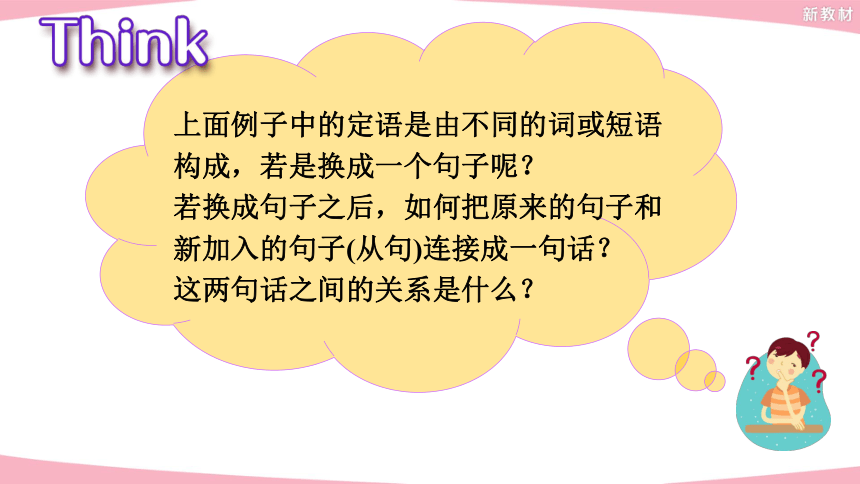
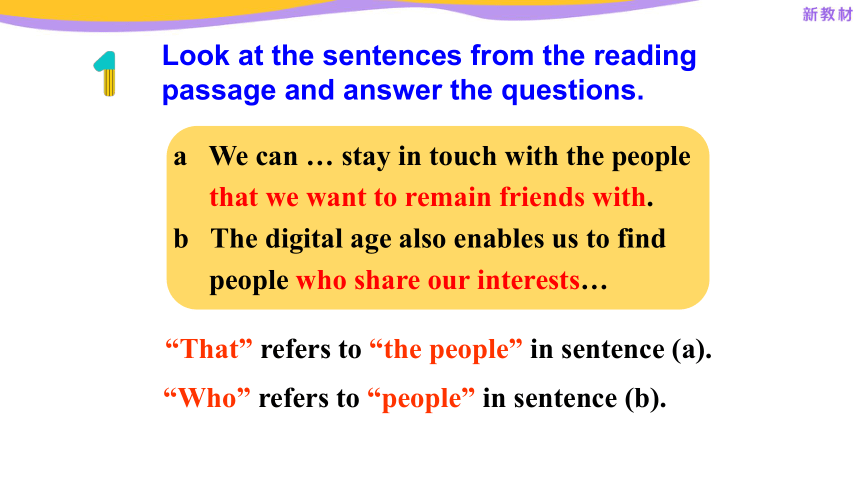
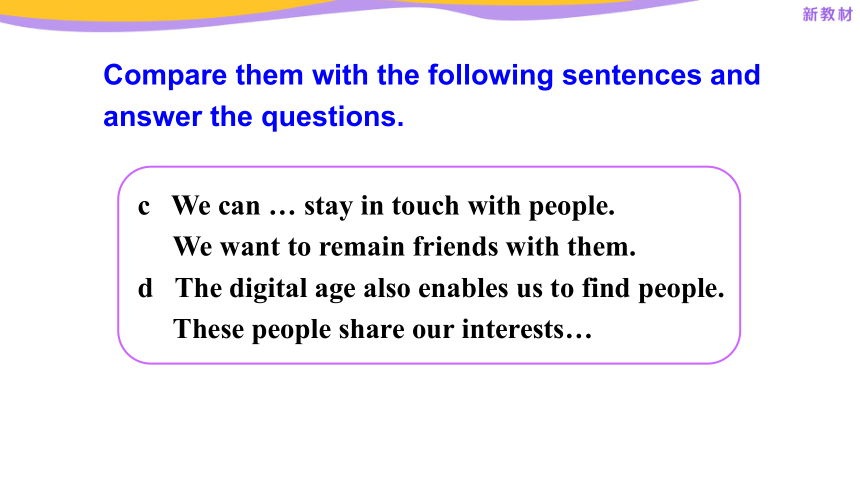
文档简介
(共29张PPT)
Unit 4
Unit 4 Friends forever
To know what an attributive clause is
To learn how to combine two relevant sentences into an attributive clause
To learn the usage of that, which, who, whom, whose in attributive clauses
To learn to write attributive clauses
subject
verb
object
predicative
direct object
indirect object
object complement
main elements
adverbial
attribute
used to modify a word or sentence
句子成分
Attribute
e.g. the digital age
true personal information
something to do working people
two ball pen Tom’s mom
定语 — 对名词或代词起修饰、限定作用的单词、短语或句子,汉语中常用“……的”表示。单词作定语一般前置,句子或短语作定语则需后置。
上面例子中的定语是由不同的词或短语构成,若是换成一个句子呢?
若换成句子之后,如何把原来的句子和新加入的句子(从句)连接成一句话?
这两句话之间的关系是什么?
Look at the sentences from the reading passage and answer the questions.
a We can … stay in touch with the people
that we want to remain friends with.
b The digital age also enables us to find
people who share our interests…
What does “that” refer to in sentence (a)
What does “who” refer to in sentence (b)
“That” refers to “the people” in sentence (a).
“Who” refers to “people” in sentence (b).
Compare them with the following sentences and answer the questions.
c We can … stay in touch with people.
We want to remain friends with them.
d The digital age also enables us to find people.
These people share our interests…
3. What is the difference between the two groups of sentences
Sentences (a) and (b) both contain a clause defining a noun in each sentence.
Sentences (c) and (d) are each constructed with a pair of simple sentences, with one defining a noun that appears in the other sentence in each pair.
4. Why does the author choose to use sentences (a) and (b) in the reading passage
Because there is a closer link and connection between “people” and the clause defining it in sentences (a) and (b). It also makes the passage clearer, and creates an emphatic effect on the people or things being defined.
5. What other words are used to introduce attributive clauses What do they refer to
Other words used to introduce attributive clauses include “which”, “whom” and “whose”. They can refer to an object or a thing, a person as the object of an action and the relationship of belonging.
Now look for more sentences with attributive clauses in the reading passage.
1. …the Internet can connect us with others who also enjoy doing them…
2. On social media sites, people tend to post only positive updates that make them appear happy and friendly.
3. Although technology has changed the way we acquire friends, the meaning of friendship and our longing for friends remain the same.
定语从句
定语从句是由关系词(关系代词或关系副词)引导的从句,其作用是作定语修饰主句的某个名词或代词。其功能相当于形容词,被修饰的名词或代词被称作为先行词。
关系词三功能
1. The people who / that called yesterday want to buy the house.
本句中先行词是 the people;关系代词who指人,代替 the people,关系代词在定语从句中作主语。翻译时可把定语从句译为主句的定语。
翻译: 昨天来电的那些人想买这个房子。
2. The man (whom / who / that) I have to phone lives in Canada.
本句先行词是 the man,关系代词共有四种表达。whom,who,that均可指人,在定语从句中关系代词作宾语, 因此在口语和非正式文体中可省略,故而有四种答案。
翻译:我不得不致电的那个人住在加拿大。
3. She was not in the train which / that arrived just now.
本句中先行词是the train,关系代词which / that 均可用于指物,代替the train,关系代词在定语从句中作主语。
翻译:她不在刚刚到的那列火车上。
4. This is the book (which / that) you wanted.
本句中先行词为 the book,关系代词 that / which指物,代替 the book,关系代词在定语从句中作宾语,可省略,故而本题有三种答案。
翻译:这就是你想要的那本书。
请根据以上例句,完成下页的关系代词用法表。
关系 代词 指代的 先行词 在从句中 所做成分 是否可省略
that
which
who
whom
whose
人,物
物
人
人
(人/物)的
主语,宾语
主语,宾语
主语,宾语
宾语
定语
作宾语可省略
作宾语可省略
作宾语可省略
可省略
不可省略
用合适的关系词填空。
1. The man __________ normally comes to clean our window is on holiday this month.
2. There's only one clock ________ works properly in this flat!
3. A widow is a woman ________ husband has died.
4. I'm enjoying the book ___________ you lent me.
that/who
that
whose
that/which
5. That's the shop assistant __________ served me the last time I came here.
6. At the party she spoke to Mr. Peterson, ________ father owned the company ___________ she worked for.
which/that
who/that
whose
Rewrite the underlined sentences with that, which, who, whom or whose.
Lucy is my friend who/that has a hearing problem.
So I learnt a new language which/that allows me to “speak” with my hands.
Lucy is a smart girl whose ideas are always inspiring.
I sometimes have problems (that / which) I can’t solve.
Lucy is a good listener (whom / who / that) I enjoy sharing moments of my life with.
Complete the online forum post with that, which, who, whom or whose.
Walking group welcomes new members!
Walk and Talk is a group ___________ meets every Sunday. It is free to join. Walk and Talk is perfect for anyone _______ weekends need some excitement.
that/which
whose
We are all teenagers _________ love walking and making new friends.
We want you to join us! The next walk ___________ is open to new members is on 22 July. You can also bring your friends. However, anyone ___________ you bring must be over 12 years old.
Come along and join the fun!
that/who
that/which
whom/who
根据括号内的提示补全下面对话。
A: Can I see your new phone Wow! 1. ________________ _________________________ (看看你所有的应用程序).
B: I know I've got a lot of apps.
A: You must spend a lot of money on new apps.
B: Not really. 2. _____________________________________ (我得到的大多数应用程序都是免费的).
A: I see you've got a new phone case. 3. _______________ ______________________________ (它不像你在北京买的那个那么酷). Why did you change
Look at all the
apps which / that you've got
Most of the apps which / that I got are free
the one that you bought in Beijing
It's not as cool as
B: 4. __________________________________________ _______________________ (这是我奶奶送给我的生日礼物). I don't want her to feel hurt. I just wish she'd given me a gift card and let me pick out my own present.
A: I'm sure she meant well.
It was the present which / that my grandmother
sent me for my birthday
Write sentences about your friend(s), trying to use some attributive clauses in your passage.
Preview Vocabulary and Listening.
Unit 4
Unit 4 Friends forever
To know what an attributive clause is
To learn how to combine two relevant sentences into an attributive clause
To learn the usage of that, which, who, whom, whose in attributive clauses
To learn to write attributive clauses
subject
verb
object
predicative
direct object
indirect object
object complement
main elements
adverbial
attribute
used to modify a word or sentence
句子成分
Attribute
e.g. the digital age
true personal information
something to do working people
two ball pen Tom’s mom
定语 — 对名词或代词起修饰、限定作用的单词、短语或句子,汉语中常用“……的”表示。单词作定语一般前置,句子或短语作定语则需后置。
上面例子中的定语是由不同的词或短语构成,若是换成一个句子呢?
若换成句子之后,如何把原来的句子和新加入的句子(从句)连接成一句话?
这两句话之间的关系是什么?
Look at the sentences from the reading passage and answer the questions.
a We can … stay in touch with the people
that we want to remain friends with.
b The digital age also enables us to find
people who share our interests…
What does “that” refer to in sentence (a)
What does “who” refer to in sentence (b)
“That” refers to “the people” in sentence (a).
“Who” refers to “people” in sentence (b).
Compare them with the following sentences and answer the questions.
c We can … stay in touch with people.
We want to remain friends with them.
d The digital age also enables us to find people.
These people share our interests…
3. What is the difference between the two groups of sentences
Sentences (a) and (b) both contain a clause defining a noun in each sentence.
Sentences (c) and (d) are each constructed with a pair of simple sentences, with one defining a noun that appears in the other sentence in each pair.
4. Why does the author choose to use sentences (a) and (b) in the reading passage
Because there is a closer link and connection between “people” and the clause defining it in sentences (a) and (b). It also makes the passage clearer, and creates an emphatic effect on the people or things being defined.
5. What other words are used to introduce attributive clauses What do they refer to
Other words used to introduce attributive clauses include “which”, “whom” and “whose”. They can refer to an object or a thing, a person as the object of an action and the relationship of belonging.
Now look for more sentences with attributive clauses in the reading passage.
1. …the Internet can connect us with others who also enjoy doing them…
2. On social media sites, people tend to post only positive updates that make them appear happy and friendly.
3. Although technology has changed the way we acquire friends, the meaning of friendship and our longing for friends remain the same.
定语从句
定语从句是由关系词(关系代词或关系副词)引导的从句,其作用是作定语修饰主句的某个名词或代词。其功能相当于形容词,被修饰的名词或代词被称作为先行词。
关系词三功能
1. The people who / that called yesterday want to buy the house.
本句中先行词是 the people;关系代词who指人,代替 the people,关系代词在定语从句中作主语。翻译时可把定语从句译为主句的定语。
翻译: 昨天来电的那些人想买这个房子。
2. The man (whom / who / that) I have to phone lives in Canada.
本句先行词是 the man,关系代词共有四种表达。whom,who,that均可指人,在定语从句中关系代词作宾语, 因此在口语和非正式文体中可省略,故而有四种答案。
翻译:我不得不致电的那个人住在加拿大。
3. She was not in the train which / that arrived just now.
本句中先行词是the train,关系代词which / that 均可用于指物,代替the train,关系代词在定语从句中作主语。
翻译:她不在刚刚到的那列火车上。
4. This is the book (which / that) you wanted.
本句中先行词为 the book,关系代词 that / which指物,代替 the book,关系代词在定语从句中作宾语,可省略,故而本题有三种答案。
翻译:这就是你想要的那本书。
请根据以上例句,完成下页的关系代词用法表。
关系 代词 指代的 先行词 在从句中 所做成分 是否可省略
that
which
who
whom
whose
人,物
物
人
人
(人/物)的
主语,宾语
主语,宾语
主语,宾语
宾语
定语
作宾语可省略
作宾语可省略
作宾语可省略
可省略
不可省略
用合适的关系词填空。
1. The man __________ normally comes to clean our window is on holiday this month.
2. There's only one clock ________ works properly in this flat!
3. A widow is a woman ________ husband has died.
4. I'm enjoying the book ___________ you lent me.
that/who
that
whose
that/which
5. That's the shop assistant __________ served me the last time I came here.
6. At the party she spoke to Mr. Peterson, ________ father owned the company ___________ she worked for.
which/that
who/that
whose
Rewrite the underlined sentences with that, which, who, whom or whose.
Lucy is my friend who/that has a hearing problem.
So I learnt a new language which/that allows me to “speak” with my hands.
Lucy is a smart girl whose ideas are always inspiring.
I sometimes have problems (that / which) I can’t solve.
Lucy is a good listener (whom / who / that) I enjoy sharing moments of my life with.
Complete the online forum post with that, which, who, whom or whose.
Walking group welcomes new members!
Walk and Talk is a group ___________ meets every Sunday. It is free to join. Walk and Talk is perfect for anyone _______ weekends need some excitement.
that/which
whose
We are all teenagers _________ love walking and making new friends.
We want you to join us! The next walk ___________ is open to new members is on 22 July. You can also bring your friends. However, anyone ___________ you bring must be over 12 years old.
Come along and join the fun!
that/who
that/which
whom/who
根据括号内的提示补全下面对话。
A: Can I see your new phone Wow! 1. ________________ _________________________ (看看你所有的应用程序).
B: I know I've got a lot of apps.
A: You must spend a lot of money on new apps.
B: Not really. 2. _____________________________________ (我得到的大多数应用程序都是免费的).
A: I see you've got a new phone case. 3. _______________ ______________________________ (它不像你在北京买的那个那么酷). Why did you change
Look at all the
apps which / that you've got
Most of the apps which / that I got are free
the one that you bought in Beijing
It's not as cool as
B: 4. __________________________________________ _______________________ (这是我奶奶送给我的生日礼物). I don't want her to feel hurt. I just wish she'd given me a gift card and let me pick out my own present.
A: I'm sure she meant well.
It was the present which / that my grandmother
sent me for my birthday
Write sentences about your friend(s), trying to use some attributive clauses in your passage.
Preview Vocabulary and Listening.
